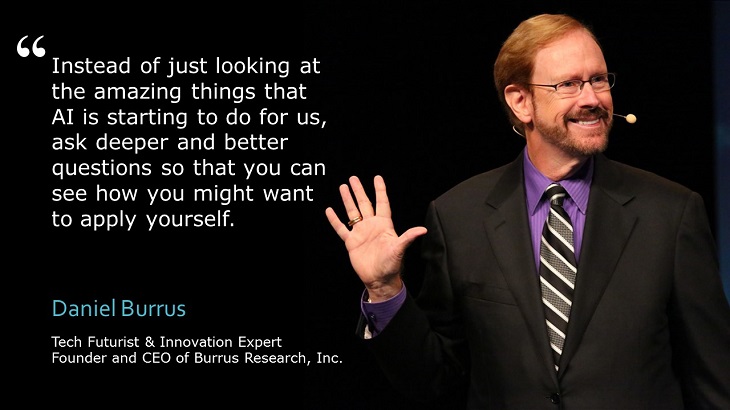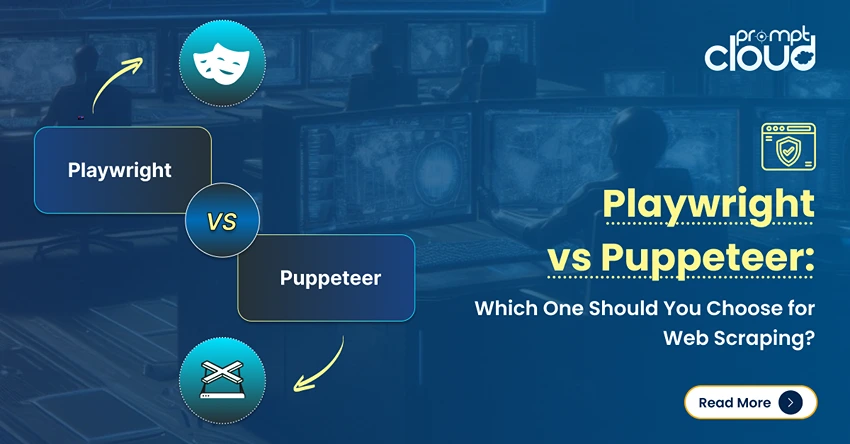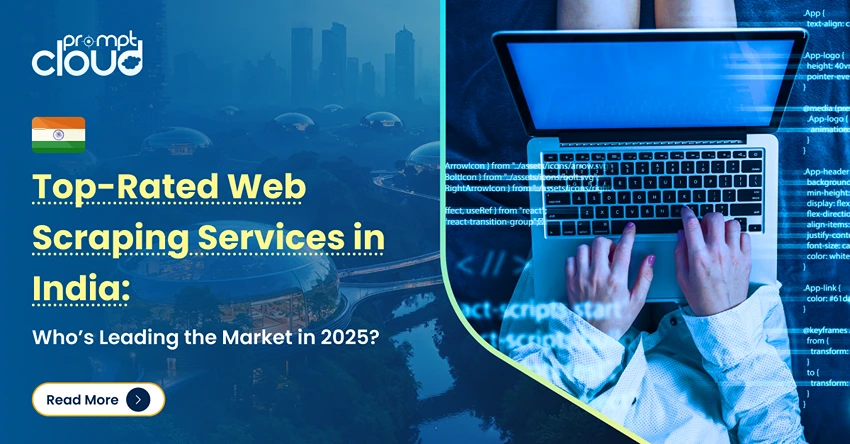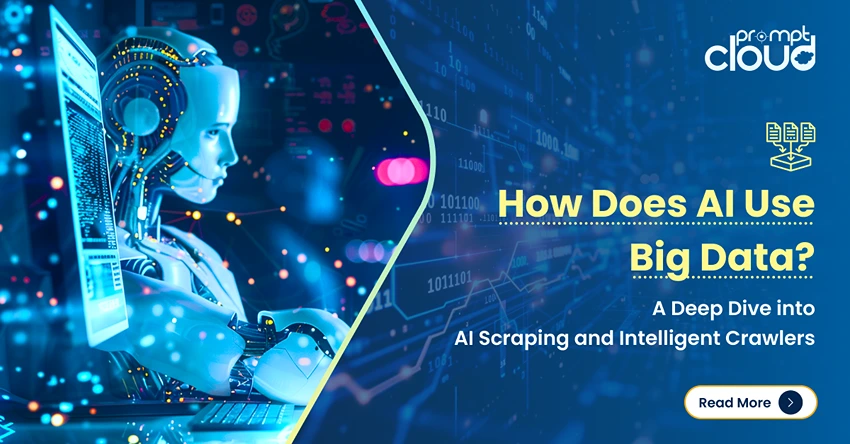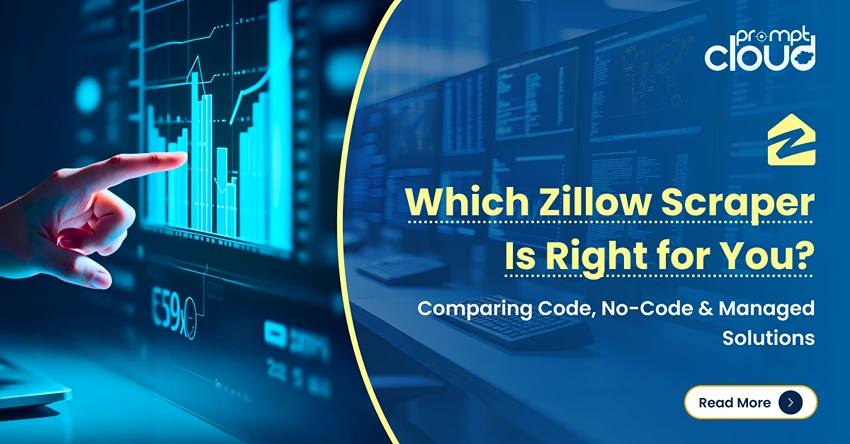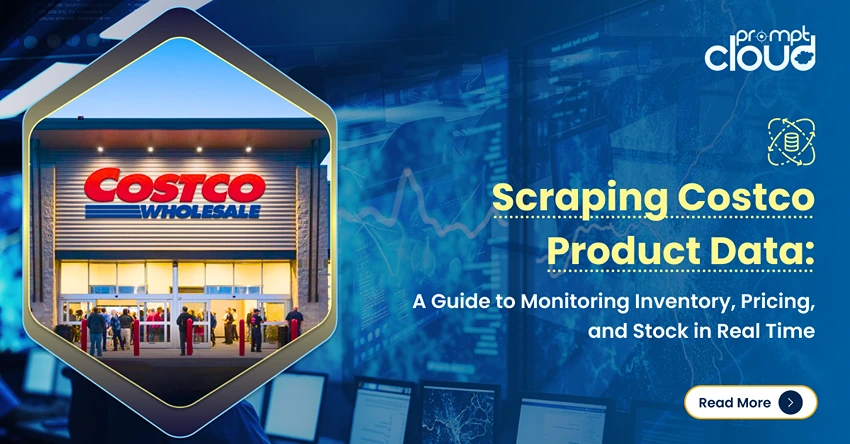Recently we got in touch with Daniel Burrus to have interesting insights on Artificial Intelligence, Blockchain, IoT and trending technologies. We also discussed about spotting hard trends to put organisations in a growth track and developing an anticipatory mindset. We’re sure that our readers are going to love the insights shared by Daniel. Here is the transcript of the interview:
[PromptCloud] First of all, thanks a lot for taking the time out for this interview. Let me introduce you to our audience – Daniel is the CEO and Founder of “Burrus Research”. He is a technology futurist, innovation expert, business adviser, author, and public speaker with strong background in research and science. He advises executives from fortune 500 companies and helps them create ground-breaking strategies. Now, without wasting much time let’s start off and learn more about Daniel.
Daniel, please tell us something that most people don’t know about you.
[Daniel] Yes, well I have started 6 companies in the United States over the years. 5 of them were profitable in the first year and 3 of them were national leaders in the United States in the first year. I share that so that you know that I don’t just write books, do consulting and give speeches. I actually put these things into action. And secondly what fewer people know is that before starting my first company I taught biology and physics. So I really have a science background. 35 years ago when I started my research company, Burrus research, I started out looking at ways of identifying future opportunities and trends. I applied a scientific principle to doing that and of course as you know I’ve written 6 books and done quite a bit of work since then.
[PromptCloud] Yes, that’s great! Now, we’d love to discuss about your book “Flash Foresight”. What kind of research has gone into it? How to predict future when almost everything related to the world is uncertain?
[Daniel] Well, that’s a great question. Thank you! Yes, my last book is “Flash Foresight” and it is a required read by many of the top companies like the IBMs, the Accenture and the Googles. And I think the key to it is a methodology that I came up with about 30 years ago – it’s about separating “hard trends” and “soft trends”. Now there’s no shortage of trends. The problem is which ones are going to happen which ones aren’t. And by using this hard trend and soft trend methodology you can find that out. So I’ll give you just a little bit of context about that and help our listeners and readers understand more about it. Okay, so hard trends are based on future facts. They will happen – it’s not about if or may be. And no matter who you are or how big your company is, you can’t stop them from happening.
The good news about them is that you can see them ahead of time when you know how to look. I’ll spend a little time help being you do that in a minute. Before doing that let me describe soft trends. Now self trends are not based on future facts – they are based on assumptions. And some assumptions of course are better than others. It doesn’t mean that a soft trend won’t happen, it just means that it is not certain. So when you ask me, how can I look into the future when the future is completely uncertain, I would say that there is far more certainty than any of us realize.
For example, can any astronomer tell you in the year 2040, in the month of March, the exact day and moment you will have a full moon. Of course, they can tell this perfectly! That’s because there is a science of cycles. You there over 500 known cycles – business cycles, weather cycles, biological cycles that allow you to accurately predict the future. Farmers know when it’s time to plant and when it’s time to harvest because of cycles.
When it comes to stock markets, we know that they don’t go up forever and they don’t close down forever; there’s actually a number of cycles influencing them. So, there is a science of cycles and cyclical change. An insight for everyone listening and reading this is that our economists use cyclical change to predict the future and in the past it’s worked quite well. But, as we all know recently they’ve been increasingly wrong about their predictions.
And the reason is that there’s another type of change in which they have no training and because it was slow they didn’t need it. But, today this other kind of change is changing our worlds and rapidly. I would call that permanent and linear/exponential change – what I mean by linear is that unlike a cycle once it happens you’re not going back. Another words – once you’ve got a smartphone you’re not going back to dumb phone. Once people in developing nations get refrigeration for their home they’re not going to say we don’t need refrigeration.
Once people in China park their bicycle and get a car, they’re not going back to the bicycle. These are one-way, linear and driven at exponential speed by technological change. So the thing that I am sharing is that it’s amazing how many certainties you can track and put accurate time frames on them. And I think as some of you who’ve read my books and gone through my work, know that I have studied thousands of trends and accurately predicted over the years by using this method.
[PromptCloud] Thanks for explaining hard trends and soft trends. Now, it brings us to our next question – What are some exciting technologies for the future that you’ve had a glimpse of?
[Daniel] Well, as you might guess there are many, many very exciting technologies that are no longer just changing our world; they are in a phase of transforming our world. Let me first explain these two words for a minute – a lot of companies and organizations say there transforming a product, a service or a process when in reality they’re only just changing. That’s because they really don’t know the difference.
So let me describe the difference for everyone. When I was a young guy I could listen to my music on a spinning disk called an album and it spun around in a 33 and a third inch device and you know it was fairly good size. As I got older, a technological change not a transformation came along – I could listen to one album with smaller spinning disk called CD. And I liked that and not just because of the size but I liked the fact that it got rid of all the hisses and pops and the scratches from my old albums. So I got all my old stuff on CD and all my new music on CD.
Today I don’t know where my CDs are. Because, I’ve got all of my music, photographs and videos and access to the world in my smartphone. The point is, it didn’t change how you listen to music, it transformed it. So now I’m going to give you a prediction. And it’s based on hard trends; in other words it will happen. Over the next 5 years we’re actually going to transform every business process – how we sell, how we market, how we communicate, how we collaborate, how we train, how we design. We’re not going to just change them, we’re going to actually transform them. And that is a hard trend. There are tools to do it. Now you might ask yourself okay so what’s the soft trend in the current time.
The soft trend is that will your business transform your products, processes and services? Or will you just change that? That is up to you! As I said it is something that might happen so whether you take action on those powerful hard trends that’s up to you. But, the good news about soft trend is you can do something about it, you can influence it.
[PromptCloud] Right, thanks for further insight. 2016 was a great year for Artificial Intelligence; almost all of the tech giants acquired AI companies and considered AI as an important part of their strategy. According to you when will be the tipping point and what will happen when AI systems will be used to create advanced AI systems.
[Daniel] Yes, well artificial intelligence is a broad topic and there are sub categories. As you know for example there’s machine learning, there’s cognitive computing and there are many other different forms. They all don’t do do the same thing. So you can’t just use one solution, you need to look at what are you really trying to do.
So we’ll talk a little bit about cognitive computing. For example, I’ve been working with the Watson team of IBM from the beginning. And just to give you a perspective – I had a chance to eat a meal that was designed by the Watson supercomputer and it was a combination of flavors and ingredients that no human chef would put together; yet it tasted fantastic. Now, how did Watson do that? Again being a cognitive computer you don’t program it, you teach it.
It uses language rather than math. So here is the question for everyone reading or listening to this – how long did Watson take to not only read but learn little over 1000000 cookbooks as well as every thing that was ever written about the science of smell and everything that was ever written about the science of taste (which is many many books so that it could create a meal that no human would design yet it’d taste great)? The answer to that question is all of that took one second.
And when you hear things like that while there are many really great things to hear, what we typically do is we say to ourselves wow that’s amazing and then we go back to getting busy. I don’t want our listeners and readers to do that anymore. What I want you to do is to spend a little longer thinking about that amazing thing and ask some different questions. For example, in the United States the tax code has 72000 pages and tax code of every other country on the planet earth is not as large but is quite big.
What if I had Watson learn the tax code of every country not just the U.S., but India, China and everywhere else in the entire world. That would take 2 or 3 seconds. If I did that, would an accounting firm have an advantage? Yes, of course! In the United States there are thousands of books of law and the same is true for every other country, but if I could take only 4 or 5 seconds to learn every single book from every country and if I was a law firm, could I make use of that to gain a competitive advantage? You know the answer is yes. The point that I’m making is that instead of just looking at the amazing things that AI is starting to do for us, ask deeper and better questions so that you can see how you might want to apply yourself.
[PromptCloud] Yes, we should definitely think about the application. Now, let’s look at the impact of AI – we as human beings continue to generate massive amounts of data. In future it will increase by many folds with adoption of AI. In this context, what will be the impact of AI on Big Data in the coming years?
Yes, thank you again! You’re asking really great questions. I appreciate that. First of all, what we call big data today is very very small data tomorrow. The reason is that every day we are exponentially creating more data. For example, I own a Tesla here in the United States and that car generates gigabytes of data within hours.
And that’s just one car. Not only that but we’re expanding the Internet of Things in a great way in India as well as in China as well as in the United States and everywhere else. Internet of Things is creating a fog; as a matter of fact they’re actually calling it fog computing and a fog of data will overwhelm most systems today. So what I would say is that I don’t want big data, I would rather have good data. Because there’s a lot of big data that has good and bad data mixed together as obsolete data and relevant data. So it’s not about how big data sources is.
First of all it’s about if the data good. And is it relevant or is it obsolete which actually makes it bad. Secondly, there’s a big difference between data, Information, knowledge and wisdom. And I what I really want is not data and information. What I really want is actionable knowledge and guiding principles. In other words wisdom. So let me refine this – I need giant amount of data through AI and high speed analytics and other systems so that I can get what I really want at the time of need. I talked to a lot of companies that said they had a knowledge base.
But when I looked at it, it really was information. That’s because they didn’t realize the difference between information and knowledge. And just to help us learn that little more, knowledge has 2 components – it has context and content. That’s why context computing is becoming very powerful thanks to AI. So when a storyteller tells you a story, they never start with the punch line, they have to give you the context and then they deliver the nugget or punch line.
So knowledge has those 2 components to it. So you understand where the big insight came from and you can you can get that if you want to. Wisdom on the other hand can usually be stated in one sentence as a guiding principle. I know there are many great quotes from famous people from Gandhi to Einstein and many others. Usually these great quotes if you think about it are one sentence long and they’re a guiding principle that could help you with what you do. So what I’m suggesting is we’re going to be creating knowledge bases and wisdom bases. And real time actionable insights will be coming from those things.
[PromptCloud] Right. So you talked about Internet of Things which is one of the rapidly growing technologies. What would you consider as the biggest challenge when it comes to IoT and wearable devices.
[Daniel] Well the Internet of Things things is made up of basically 2 components if you break it down to its most simplest form and that is connected machines as well as connected sensors. So a lot of people think it’s M2M or machine to machine communication. But, if It was just that you’d be missing over the sensors that provides actionable intelligence to the machines. And all of those machines run on applications of some kind.
And all of those apps are gateways to use that data. And the cloud is where those apps live and function. So in other words the Internet of Things needs the cloud computing. And a little comment about that – not all clouds are created equally as I’m sure all of us know and there are now clouds that are being designed specifically for the Internet of Things. Customized just for that application so that cloud-enabled apps will work for you anywhere, anytime and anyplace.
And then one other little thought and the I’ll get to our question and that is the advantages of the Internet of Things. It’s of course monitoring and controlling the physical assets you have. You get to control them in the real time so it’s real time asset management. It allows you to have much faster response times. It creates huge cost savings. But, the biggest benefit that sometimes is overlooked is it allows you to predict and prevent.
Thanks to these connected devices, we’re getting knowledge and we can predict problems to pre-solve them which is a huge benefit. To answer your question about what’s the biggest challenge – I think it’s cyber security. Again, they are running on apps and the more connected we are, the more dependent we become on these connections. And as we all know if something can be hacked, a person will find a way to do it.
As we create new defenses along with offenses, i.e., ways of preventing cyber-crime as well as identifying it (by the we’ll use AI to do that), the new bad guys will continue to find ways to slice through and hack. I think the biggest problem is going to be around how to protect and secure our IoT devices.
[PromptCloud] Exactly! Last year also there were cyber-attacks using IoT devices. Security is certainly a big issue here.
[Daniel] Actually, as a matter fact I work with a cyber security firm. What they do is they go into and work with hospitals not just in the United States but all over the world. And no matter how big and good they think they are with their IT systems, this company is able to quickly hack into them and get access to everything. And I’ll tell you they usually are hacking into some connected device in a patient’s room or something like that. Another word is exploiting the vulnerability of Internet of Things. So we are going to get better at that but at the same time we’re going to learn new things as well.
[PromptCloud] Let’s talk about another technology that has caught considerable attention – the Blockchain. What are your views on this? Will it transform human lives?
[Daniel] That is another excellent technology we can discuss. I think it is a hard trend; another words – it is growing in its importance and influence at an exponential rate. And I think you know there’s a lot of confusion around Blockchain. If I were to sum up Blockchain with four words, I would say – secure, digital, direct, transfers. All 4 of those words are very powerful. Secure applies to the security requirements that we need to combat cyber risks. Direct means that it’s a direct transfer without using middleman because Blockchain eliminates the middleman in transactions and so on.
When it comes to transferring we’re really talking about whether it is a documented a contract or cyber currency. It’s quite amazing what that can be. So a couple of other things about Blockchain is that there’s no single point of failure because it’s distributed in nature. Blockchain can increase efficiency and then there’s time stamping, there’s tamper proof audit trail. And of course because there’s no central authority that’s the part where security comes in. So I see Blockchain as something that is a very powerful tool that you’ll be increasingly using.
Let me just describe it in another way – it’s a system that ensures secure digital direct transfers. Blockchain decentralizes transactions by eliminating the middleman therefore allowing direct connections among all involved parties. And so in addition to currency, Blockchains can be used to transfer contracts, insurance policies, real state titles, bonds, votes and other items of value. Given that security is better, Blockchain will create a platform that will impact limitless products and services. There are many applications taking place there right now with Blockchain.
And you know we only have so much time for this interview let me give you another thing that you can do if you’d like. I publish a list of technology driven trends each year and I recently released a list of 20 trends. If you would like you can contact my office or go to Burrus.com and look under resources to find the trend list. And now you can either I take it out of there if you’d like and it should be fine as long as you give me credit for. You can also give people a link to it so they could find themselves [here is the link].
[PromptCloud] One more question related to Blockchain – how can companies make sure that it goes mainstream?
[Daniel] Yes, well when you think of Blockchains, added ‘s’ at the end of the word meaning there isn’t one Blockchain. You can create limitless numbers of Blockchains depending on what you’re trying to do and for example, right now Walmart, the big retailer is working with the government of China to create Blockchain for the supply chain. This will ensure that products that are being made are being sent in a proper way eliminating some of the tampering issues that they’ve been dealing with in their supply chain.
They’re applying Blockchain technology in the supply chain to make it more secure and less vulnerable to counterfeiting and all the other issues that sometimes take place. And I mentioned insurance companies are starting to use it so it is not one thing – I think of it as an exponential technology. And here’s what I mean by exponential technology – it is basically a platform that allows you to create products and services and new revenue streams.
So an example of the exponential technology is cloud. Another example is virtualization, because you can virtualize hardware, you can virtualize software, you can virtualize almost any service. Mobility is another one, data analytics is another one. We talked about cognitive computing and deep learning.
Those are other examples. Blockchain is one. So these are really platforms for growth. For companies interested in this, listening to this, you should do some research on Blockchain. As a matter of fact, you can use Google or other search engines to easily find ways of using Blockchain that can serve you and your clients.
[PromptCloud] Before wrapping up this interview, I’d like to discuss about one more thing – what are your goals for Burrus research in the next 3 to 5 years.
[Daniel] Well, thank you. I appreciate that. I am on a very strong mission to teach a missing competency. It’s one that we didn’t need in the past, but vital for all of us on planet earth going forward. And that is how to anticipate. You see we are good at reacting. And changes are coming faster and faster to us including disruption. And so far the best that people have come up with is to be agile. But you have to ask yourself that the people who came up with the idea for Uber or Airbnb or even Steve Jobs when he came up with the idea of iPod or iPhone, did they use agility to do that?
The answer is no. What they used was the ability to anticipate. The disruptions before they disrupt. Creating game changing opportunities by using this hard trend and soft trend methodology that I’m talking about. So I will have about 6 months from now for a new book. It’s called the anticipatory organization. And that is around how to anticipate problems, disruptions, customer needs and game changing opportunities. Like my other ones I’m sure that it will be a global book because they’ve all been global bestsellers. I think that’ll happen to this book as well.
Secondly, I have a learning system that I created for leadership. And it has already won product of the year award. It’s called The Anticipatory Organization – an online learning system. So companies both in India, in the United States and all over the world are starting to use that and getting amazing results. What I’m really doing is trying to get people to realize the power of being a predictive enterprise and an anticipatory organization.
Because if you think about it, problems are coming to us faster and faster. You’re going to drown in them if you don’t see them ahead of time and pre-solve them. And disruption will disrupt you again and again, faster and faster unless you are able to see the disruption before they disrupt. If you are able to see the disruptions before they disrupt then you have a choice to become the disrupter.
So I’m on a mission to help everyone become anticipatory rather than just imaginary. And I’m going to do that using the systems and tools that I’m providing everyone globally. As you can tell I’m quite passionate about that. I think as human beings on the planet earth we’re going to need that. I’ve a 30-year track record of doing that and I want to teach others do it.
[PromptCloud] Thanks again for your time. It was a great discussion and I’m sure anyone who reads this will surely gain valuable insights.
[Daniel] Thank you very much. It was a pleasure meeting you via Skype.




